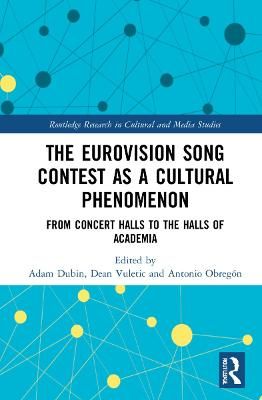
The Eurovision Song Contest as a Cultural Phenomenon: From Concert Halls to the Halls of Academia
- Author: Obregon, Antonio
- Author: Vuletic, Dean
- Editor: Dubin, Adam
Book
$183.50Printed on demand
Contents
- Part I From Lugano to the Classroom: The ESC and Academia
- 1. The Grand Tour: The Origins of the ESC as a Cultural Phenomenon
- 2. The Eurovision Song Contest: An Academic Phenomenon
- 3. A Human Rights-Based Analysis of the Eurovision Song Contest and the European Broadcasting Union
- Part II From Past to Present: History, Politics and Society
- 4. The Mythology of Song Contests
- 5. Teaching European History and Memory through Eurovision During the Covid-19 Pandemic
- 6. A March for Power: The Variety of Political Programs on the Eurovision Stage
- 7. The Molitva Factor: Eurovision and 'Performing' National Identity in World Politics
- 8. A Critical Pedagogical Eurovision Euphoria: The Potential of the Eurovision Song Contest to Promote Values Propagated by the European Union within Formal Learning Contexts
- 9. Sharing Values in the Eurovision Song Contest and OTI Festival: The Moral Fourth Person in the Lyrics of the Winning Songs
- 10. Eurovision in the Boardroom: What Does Voting Order Tell Us About Decision Making?
- Part III From Stage to Screen: Film, Media, and Music
- 11. High, Low, and Participatory: The Eurovision Song Contest and Cultural Studies
- 12. Queer Camp Against Franco: Ivan Zulueta's Eurovision Song Contest Parody Un Dos Tres
- 13. The Eurovision Song Contest and European Television History: Continuity, Adaptation, Experimentation
- 14. From Trouble to Bubble? The Ambiguous Relationship between Professional Journalists and Fan Media in the Eurovision Song Contest
- 15. Domesticity, Mass Media, and Moving-Image Aesthetics: The Visual Identity of the Eurovision Song Contest as a Hospitable Platform
- 16. Armchair Researchers: Modes of Ethnographic Research for Understanding and Experiencing Eurovision
- 17. Between Concepts and Behaviors: The Eurovision Song Contest and Ethnomusicology


